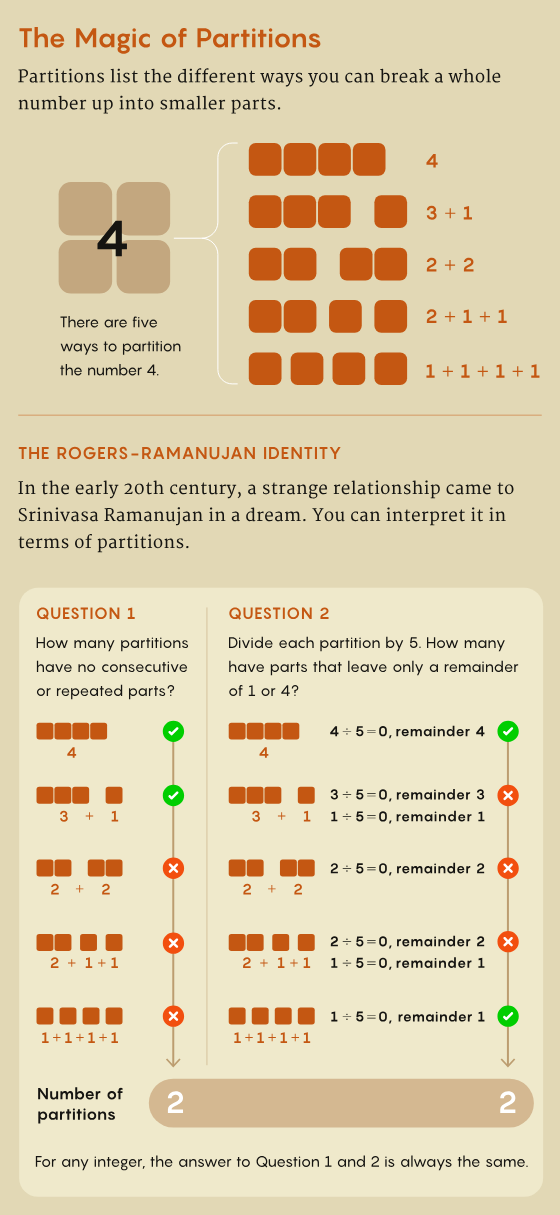2025/02/24
2025/02/11
2024/10/28
Math Is Still Catching Up to the Mysterious Genius of Srinivasa Ramanujan
Math Is Still Catching Up to the Mysterious Genius of Srinivasa Ramanujan
Consider an integer such as the number 4. It can be broken up into parts in a finite number of ways: You can write it as 4, as 3 + 1, as 2 + 2, as 2 + 1 + 1 or as 1 + 1 + 1 + 1. Mathematicians say that the number 4 has five “partitions.” Bigger numbers have far more partitions: The number 200, for instance, has nearly 4 trillion. Partitions are so basic that “people have thought about them as long as people have thought about mathematics,” said Andrew Sills(opens a new tab) of Georgia Southern University.
The first mathematician to study partitions systematically was Leonhard Euler in the 18th century. He proved the very first partition identity: that for any integer (say, 4), the number of partitions whose parts are all odd (two partitions in this case: 3 + 1 and 1 + 1 + 1 + 1) is equal to the number of partitions whose parts are all distinct, meaning there are no repetitions among them (4 and 3 + 1).
MacMahon saw that the two Rogers-Ramanujan identities could be interpreted in a similar way. (The German mathematician Issai Schur, isolated due to World War I, independently discovered the identities and came to the same conclusion.) The sum side of the first Rogers-Ramanujan identity counts the number of partitions of a given integer that don’t have any duplicated or consecutive parts. (For the number 4, there are two: 4 and 3 + 1.) The product side counts the number of partitions whose parts all leave a remainder of 1 or 4 when divided by 5 (4 and 1 + 1 + 1 + 1). For any integer, the number of partitions satisfying each condition will always be equal.
This is a very weird fact. It’s mysterious,” said Shashank Kanade(opens a new tab) of the University of Denver. “I mean, where did the 5 come from?”
For much of the 20th century, mathematicians would delight in thinking about the strange hidden phenomena that Ramanujan had unearthed. During World War II, for instance, the physicist Freeman Dyson wrote that he “kept sane by wandering in Ramanujan’s garden.”
2024/04/15
2024/03/31
2024/02/28
2024/01/19
2024/01/13
2023/12/01
2023/11/27
2023/10/27
2023/10/26
2023/09/29
2023/09/27
How Isaac Newton Discovered the Binomial Power Series
How Isaac Newton Discovered the Binomial Power Series
Rethinking questions and chasing patterns led Newton to find the connection between curves and infinite sums.
2023/09/21
How The Most Useless Branch of Math Could Save Your Life
2023/08/24
The absurd circle division pattern (updated) | Moser's circle problem
-
Psychology and Relationships I’ve studied the science of happiness for 10 years—take 5 ‘simple yet powerful’ steps each day to feel happie...
-
Arizona's huge new dark sky observatory: See the construction progress Renderings & Floorplan The 22,000 square-foot IDSDC will ac...

